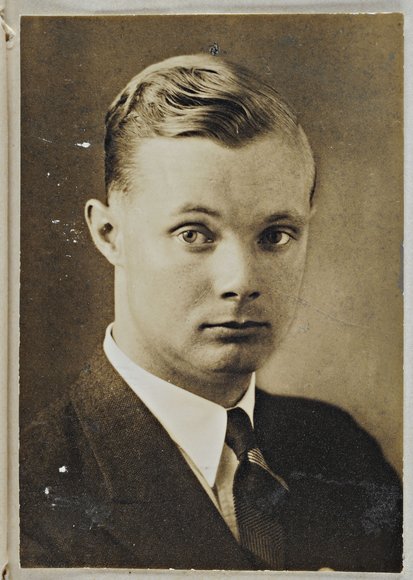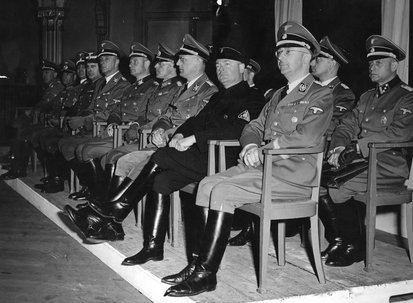Max Frauendorfer - Director of the Labour Office of the General Government
Career in the party
Max Frauendorfer was born in 1909. He joined the Nazi Party (NSDAP) and the SS at the age of 18. Within a few years, the lawyer had made an impressive career within the party’s structures, quickly occupying important positions. From 1934, Frauendorfer was head of the training offices of the German Workers´ Front (DAF) and the NSDAP. He was dismissed from all his posts in 1936 following power struggles in the top echelons of the NSDAP. Frauendorfer, however, retained his connections with top Nazis, including Reichsleiter Hans Frank, who promoted his career.
Head of the Labour Department in the General Government
Immediately after the outbreak of war in September 1939, Frauendorfer was transferred to the General Government where, in November 1939, he was appointed by Governor Hans Frank as head of the newly created Labour Department. In 1942, Frauendorfer rose to the head of this office. His duties included organising the registration, recruitment and allocation of Polish workers. This made him responsible for the conscription and deportation of hundreds of thousands of Poles. Initially Frauendorfer rejected coercive measures, but the pressure to exploit occupied Poland as a labour reservoir grew rapidly. The German labour administration relied on the cooperation of Polish local authorities and increasingly used violent means to obtain workers.
Max Frauendorfer was also responsible for the “labour deployment” of the Jewish population in the General Government. By mid-December 1941 at the latest, Frauendorfer was aware of the plans to murder the European Jews. The organised murder of the Jewish population in the General Government began with the first deportations to the Belzec death camp in March 1942. Frauendorfer was against the genocide. He saw the mass murder as threatening to exacerbate the labour shortage in occupied Poland and argued that the murders should be postponed, at least until the end of the war. This position was in sharp contrast to the attitude of the Reich Security Main Office (RSHA), the SS and the police leadership in the General Government, all of whom urged him to implement the plans to murder the Jewish population immediately.
Frauendorfer was now persona non-grata as head of the Labour Department in the General Government. His attitude towards the murder of Polish Jews was one of the decisive reasons. His acquaintance with Ulrich von Hassell, who was active in the Resistance, further damaged him. Von Hassell noted in his diary on 20 December 1942 that Frauendorfer had expressed to him grave concerns about the murder of Polish Jews. Meanwhile, Frauendorfer was negotiating with Himmler for an honourable exit from his office. In July or October 1942, Himmler informed Frauendorfer that he was to be transferred to war service in the Waffen-SS.
In December 1942, Hans Frank dismissed Frauendorfer from his post as head of the department. In February 1943, Frauendorfer managed to get himself drafted into the Wehrmacht, thus avoiding transfer to the Waffen-SS. He served as an ordinary soldier in Landsberg am Lech until 26 April 1945.
Post-war career
After the war, Frauendorfer disappeared from public view, living with his wife under an assumed name in the Allgäu region of Germany. Because of his previous job as head of the Labour Department in the General Government, he was – quite rightly – afraid of being extradited for a trial in Poland. By 1950, however, there was no longer any threat of extradition. Frauendorfer once again lived under his real name. He underwent denazification proceedings, in which he was able to argue on appeal, based on von Hassell’s diary entry, that his attitude had almost been one of resistance, and he emerged from the proceedings as a “lesser offender”.
Frauendorfer was soon able to establish himself professionally again, this time at the Allianz insurance company in Munich. Within a few years, he had risen to head the company's industrial division. He also made a rapid rise in politics. After joining the conservative CSU (Christian Social Union) party in December 1956, he stood as a candidate in the 1958 Bavarian state elections. He failed, however, after press reports revealed his Nazi past. Although he tried again to emphasise his connection with the resistance and to portray himself as a resistance fighter, he had to give up his candidacy and all his party posts. In 1962, as a protégé of Franz Josef Strauss, Frauendorfer had another chance at a political career in the forthcoming elections to the Bundestag. But the press coverage was even more intense than in the late 1950s. It was clear that public opinion would not tolerate an obvious Nazi offender holding political office. In 1963, as a result of the press coverage, Frauendorfer lost his job at Allianz Versicherung and his status as a candidate for the CSU.
Frauendorfer lived quietly in Tutzingen until his death on 25 July 1989.


